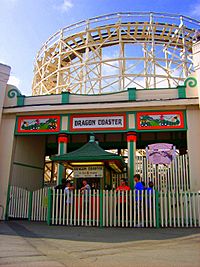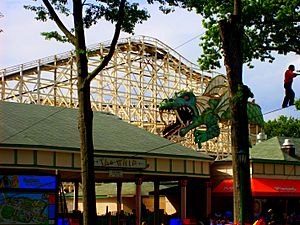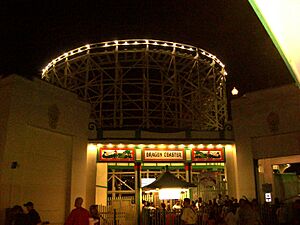Dragon Coaster (Playland) facts for kids
Quick facts for kids Dragon Coaster |
|
|---|---|
 |
|
| Playland | |
| Location | Playland |
| Coordinates | 40°58′03″N 73°40′26″W / 40.967500°N 73.673900°W |
| Status | Open |
| Opening date | 1929 |
| General statistics | |
| Type | Wood |
| Designer | Frederick Church |
| Track layout | Out & back |
| Lift/launch system | Chain lift |
| Height | 24 m (79 ft) |
| Drop | 23 m (75 ft) |
| Length | 1,036 m (3,399 ft) |
| Duration | 1:40 |
| Height restriction | 48 in (122 cm) |
| Trains | 2 trains with 6 cars. Riders are arranged 2 across in 2 rows for a total of 24 riders per train. |
| Dragon Coaster at RCDB | |
The Dragon Coaster is a classic wooden roller coaster at Playland amusement park in Rye, New York. It first opened way back in 1929! This exciting ride was designed by Frederick Church, who was also known for creating another fun ride called the Racing Derby.
The Dragon Coaster's track is about 3,400 feet long. At its highest point, it stands about 80 feet tall. A cool feature of the ride is a tunnel shaped like a dragon's body with an open mouth. This kind of tunnel was common on wooden roller coasters from the 1920s. You might have even seen the Dragon Coaster in movies like Fatal Attraction or Big (starring Tom Hanks). It also appeared in Mariah Carey's music video for "Fantasy"! The Dragon Coaster is still thrilling riders today.
What's the Ride Like?
Your adventure on the Dragon Coaster starts at the boarding station. Once you're safely in your seat, the ride operator uses a special lever to release the brakes. These brakes are still controlled by hand, which is pretty rare for roller coasters today! Your train then rolls down a small slope towards the lift hill.
As you reach the top of the lift hill, you get a quick peek at the Long Island Sound. Then, get ready for a sudden dip that gives the train a burst of speed! The train quickly turns left and plunges down the main drop, which is about 80 feet tall. You'll zoom under the lift hill, passing close to some "head-choppers" – parts of the structure that look like you might hit your head (but don't worry, you won't!).
Next, the train climbs into a turn-around right above the boarding station. Then, it goes down a "double-dip" style drop. This sends the train rushing right into the mouth of the dragon!
Inside the Dragon's Mouth
As your train enters the tunnel, you'll hear a loud roaring sound effect. The dragon's eyes also light up, making it feel even more real! The tunnel curves around, and then sends you out onto the coaster's left side.
After exiting the tunnel, the train dips down onto a short straight section. Then, it climbs up into another turn-around at the far end of the track. The train then heads back towards the center of the ride. After a few more dips and turns, you'll reach another turn-around, which is directly under the dragon tunnel. The train then goes out and back one more time before heading back to the boarding station. When the ride is over, you'll exit the train, and the operator will manually block the train for the next group of riders.
This roller coaster was designed to fit perfectly on top of another ride called the Old Mill, which was also created by Frederick Church. The coaster's dips are placed in open areas between the Old Mill's tunnels, and some even go over the tunnels! Both rides have been at Playland since it first opened, nearly a century ago.
A Piece of History
The Dragon Coaster is a very important part of Playland's history. It's considered a "contributing component" to the park's National Historic Landmark status. This means it's recognized as a special place that helps tell the story of American history. A sign at the loading station shows that the Dragon Coaster was one of the very first attractions when Playland opened.
It's also special because the ride is still stopped using a manual braking system. Not many roller coasters today can say that! The coaster used its original train cars until the early 1980s. When it became too hard to find parts for those old trains, they were replaced with new ones from Morgan Manufacturing. These newer trains are also used on two other famous wooden roller coasters in California, the Giant Dipper in San Diego and the Giant Dipper in Santa Cruz. These are the only other roller coasters designed by Frederick Church that are still running!
If you visit Playland, you can even see one of the original train cars! It's set up across from the entrance, next to where you can buy your on-ride photos. You can sit in it and take pictures, imagining what it was like to ride the Dragon Coaster almost 100 years ago!
 | Delilah Pierce |
 | Gordon Parks |
 | Augusta Savage |
 | Charles Ethan Porter |



